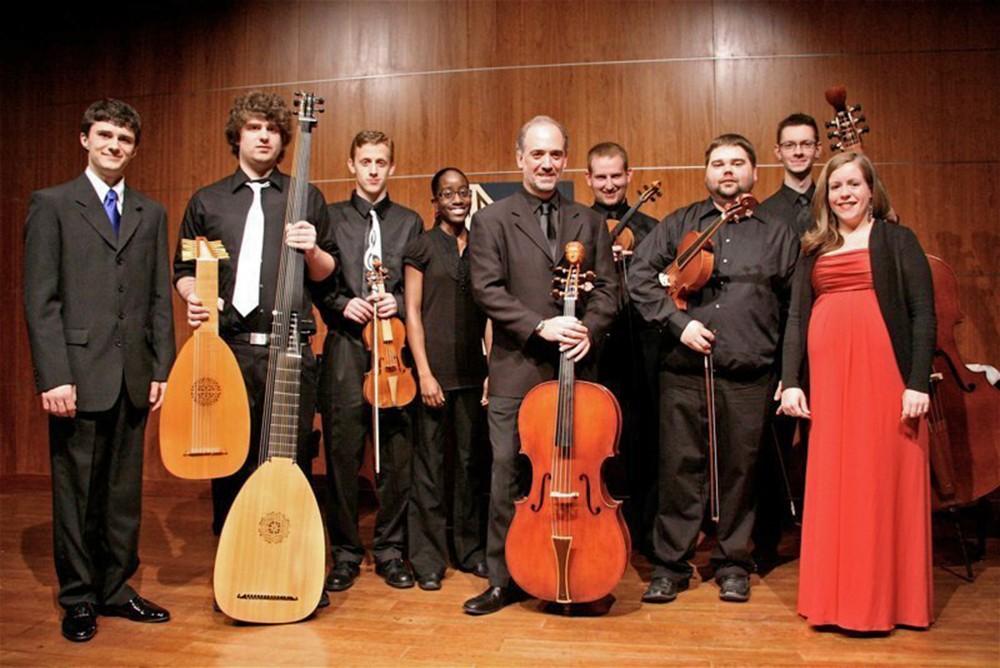Early Music Ensemble brings Baroque music to a modern audience

Courtesy / Pablo Mahave-Veglia Early Music Ensemble
Mar 19, 2014
The concept of classical music is sometimes used as an umbrella term, encompassing all genres of orchestral music and more. The Early Music Ensemble of Grand Valley State University, which principally plays Baroque-era music, showcases that this is not the case.
“(Baroque music) is a different sort of classical music,” said Kevin Flynn, cellist. “It’s not like you can generalize and say that classical music is all we play at the (Performing Arts Center)…it does not fit what is actually going on: each genre is different and special and does its own thing.”
The Early Music Ensemble was founded ten years ago by Pablo Mahave-Veglia, associate professor of cello at GVSU. The group plays Baroque music, designated as a period of artistic style that lasted from 1600 until the early 1700s. On March 23 at 3 p.m., the ensemble will play a free concert in the Sherman Van Solkema Recital Hall, which kicks off a series of performances for the group. It will showcase the improvisation and instrumentation unique to the Baroque era.
“One of these things this (ensemble) addresses is how music was performed at the time, and we try to recreate that environment,” said Mahave-Veglia, director of the group.
The ensemble uses period instruments, which include Baroque cellos, violins, violas, a harpsichord, a lute and a theorbo — a long-necked, plucked string instrument. Baroque music is notated in such a way that any number of instruments can be used to play certain lines in the score.
“Baroque music (uses) a great deal of improvisation. Composers who wrote every detail of music (were the) Brahms and Beethovens. Baroque composers weren’t that specific,” Mahave-Veglia said. “Composers played their own music or participated in the performance so it was looser or a more freestyle enterprise.”
Another major characteristic of this style is the use of an accompanimental line called basso continuo. While bass instruments play this line, chordal instruments such as the harpsichord improvise above it.
On Sunday, the group will present works by Baroque composers such as Antonio Vivaldi and Antonio Corelli.
“The composers are not that important — it’s something that is very different from more current music or even Romantic music,” Mahave-Veglia said. “We think of music by Beethoven as an extension of his autobiography…In Baroque times, this was not thought to be relevant. A good composer could write music in a genre that fit audience and performer expectations. Whether he was having a good or bad day did not have an effect on the music.”
Kevin Flynn, a cellist, has been an ensemble member since the beginning of the 2013 fall semester. In the group, he plays a Baroque cello and found that playing the instrument was quite an adjustment.
“It’s a different instrument and the differences aren’t subtle,” Flynn said. “So that was a challenge. Listening for most importantly the imitation (in Baroque music), being a continuo player instead of a part of the orchestra…there’s really nothing like it in modern music except the rhythm section in a jazz group. It’s sort of becoming a different player.”
As a continuo player, he typically plays one note during a piece.
“I don’t have much room for improvisation, but (soloists) can do some fun things with range, voice leading — those sorts of things are left up to the performer,” Flynn said.
He will get to try his hand at improvisation when playing a sonata for cello and continuo at an upcoming concert. Despite his part’s minimalist style, Flynn enjoys playing Baroque music.
“I like the style of writing,” he said. “…the music has a different air. It’s a different feeling, listening to a Baroque ensemble instead of a symphony. Dare I say, it’s a more sensitive music, or at least very sensitive. Especially in solo repertoire — the ability to improvise, which just isn’t found anywhere else in classical music.”
The performance on Sunday will strive to be as historically accurate as possible.
“I have to keep in mind when attending (concerts like this) that this was the vernacular for these people (living in the Baroque era),” Mahave-Veglia said. “The music was regular and normal and everybody was well-versed in its practice.”
In a way, Sunday’s concert will be a way to step back in time, if just for an hour and a half.
“It’ll be a fun concert,” Flynn said. “There will continue to be exciting things happening with the Early Music Ensemble.”























